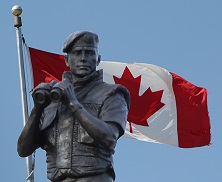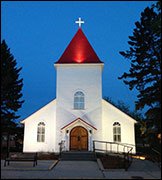True and Fascinating Canadian History
The Mystery of
The Mostly Married Mountie
by J. J. Healy

I think it's best if everyone keeps this little story a secret.
After all these years, no one wants to implicate themselves. And besides, Canadians as a whole wouldn't believe this Mystery.
But to begin, I do seem to recall that up until the mid 1970's members who joined the Force were required to serve Canada and the RCMP and no other. For some, marriage was outlawed. In the popular press, it was widespread knowledge that RCMP members were ruled from within as strictly as new recruit Jesuits.
It was said that Jesuits feared God alone. And, RCMP members feared the Commissioner who believed, on occasion, that he was God. It's commonly accepted that God created marriage for the benefit of man and woman - but beginning with the North West Mounted Police in 1873, and for many years thereafter, the Commissioner tried to surpress biology and all that which comes naturally.
Truthfully, there were some similiarities and distinctions between Jesuits and the RCMP. It was difficult to gain entrance to either society. Both were solely male organizations. Training took years and many recruits dropped out along the way due to the rules and regiment. Jesuits set high educational standards. The RCMP had strict height requirements. Jesuits dressed in black, the RCMP in red. Jesuits were known to work clandestine in plain clothes for the purpose of spreading Christianity.
Experienced RCMP worked undercover to eliminate drugs; members with less service worked undercover because of marriage restrictions. Jesuits took an oath of celibacy until death. RCMP members took an oath to the Force, but were not allowed to get married until several years had passed; seven years in the early days, then five years up until the 1950's and two years until the mid 1970's. 'Must maintain a mobile Force', said the Commissioner. 'Phooey', said Canadian women who wanted to marry an RCMP member. 'Mr. Commissioner -- I need my man!'
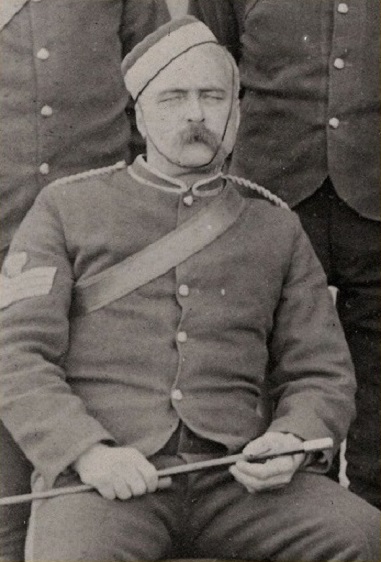
There was no rule of celibacy in the RCMP, but to most RCMP, women could not be resisted. It was a big problem as biology could not be rightfully explored, nature and nurture were limited. The mobility rule which cancelled marriage, caused division within the RCMP causing many of its members to leave the Force to get married. Seems that any Canadian women who had faith in God had far little faith in the Commissioner. The RCMP and marriage had little to connect each other! Population growth in Canada stood as still as the Mounties on the Hill!
^ Back to Top ^
First signs of trouble with marriage and the NWMP began round 'bout 1873. Martin Malcolm McIntosh of Prince Edward Island, Canada heard that the North West Mounted Police (NWMP) was being newly organized in Upper Canada. The NWMP desperately needed good recruits. Single recruits. Mobile recruits. Recruits who could ride a horse. At the time, McIntosh was serving in 'A' Battery in Kingston, Ontario under Lieutenant-Colonel French but he decided to purchase his discharge out of Army and head to Toronto, ON to enlist.
His application was favourably received and McIntosh was assigned Reg.#41 on October 8, 1873. But, the NWMP process of engagement was not without its glitches. McIntosh needed some good luck. He held a secret both in his heart as well as back home.
First, McIntosh had a problem with Rules and Regulations. One might say he was a resister. In particular, he disliked that that the NWMP were only accepting single recruits. Not fair. He also realized that Lt. Col. French might recognize his name from having been in the Army in Kingston. At recruitment time, considering all the risks, McIntosh decided that he would use an alias to gain entrance into the NWMP. He chose the name John Alfred Martin. In fact, Martin was his real first name.
Time passed. McIntosh (alias John A. Martin) served in the NWMP for 25 years. He retired at the rank of Staff Sergeant and he holds the distinction of being the first NCO in the NWMP to draw a Canada pension. Guess? It amounted to $ .90 a day.
So? Why did McIntosh use an alias? The reason for the alias was that he was married and had 2 sons. McIntosh would have been refused entry into the NWMP if he admitted to having been married. McIntosh surmissed that he had to do what had to be done. Some years later, after arriving in the West and settling in, McIntosh called for his wife and their two sons. He fabricated a story that the woman was his widowed sister, Effie McIntosh and his two nephews! Life was good. Nature was equal. He would finally be warm.
The McIntosh sons were John W. McIntosh who was born in 1869 and Neil A. McIntosh who was born in 1870. McIntosh's second son, Neil Alexander McIntosh, eventually joined the NWMP as Reg.#2477. Neil died as a Constable on November 21, 1894 at age of 24 yrs. He is buried in the old NWMP Cemetery, Southwest of Maple Creek, SK.
Staff Sergeant McIntosh (alias Martin) died in 1933 at an old age. He is buried in People's Cemetery, Parkdale, PEI.
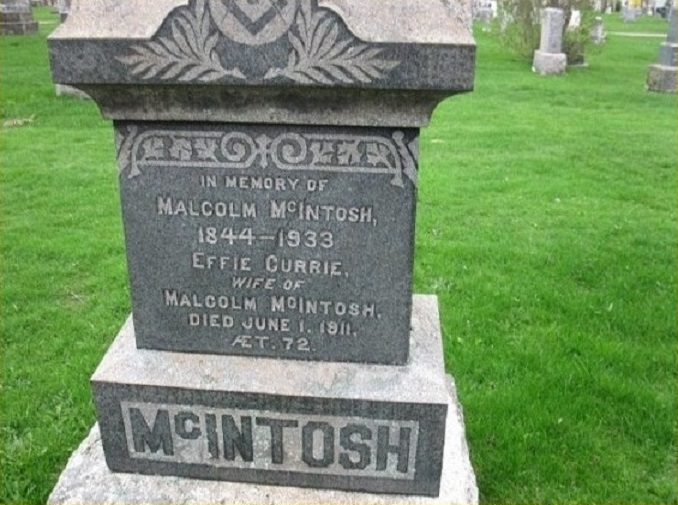
Perhaps McIntosh was no Jesuit. Any harm caused? It wasn't until after 'Staff Sergeant Martin' retired and moved back to P.E.I. that the family applied to rectify and correct his name in regards to his NWMP service and his pension.
In this case, marriage didn't seem to get in the way or interupt McIntosh's career, eh?
I'd like to thank history buff Superintendent Brian Brennan of 'H' Div. for the photo (sitting left) of Staff Sergeant McIntosh and also for first bringing the Mystery story of McIntosh to my attention.
I'd also like to thank Vet. Dave Holmes of 'L' Div. for the photo of McIntosh's gravesite in Parkdale, PEI and for providing me with his research notes from which I was able to frame this story.
I wish also to advise readers that a full story of Staff Sergeant McIntosh's experiences in the NWMP appeared in the July 1933 RCMP Quarterly, VI (1), p. 35. The Quarterly article was written by Constable W. J. Monoghan then of "L' Div.
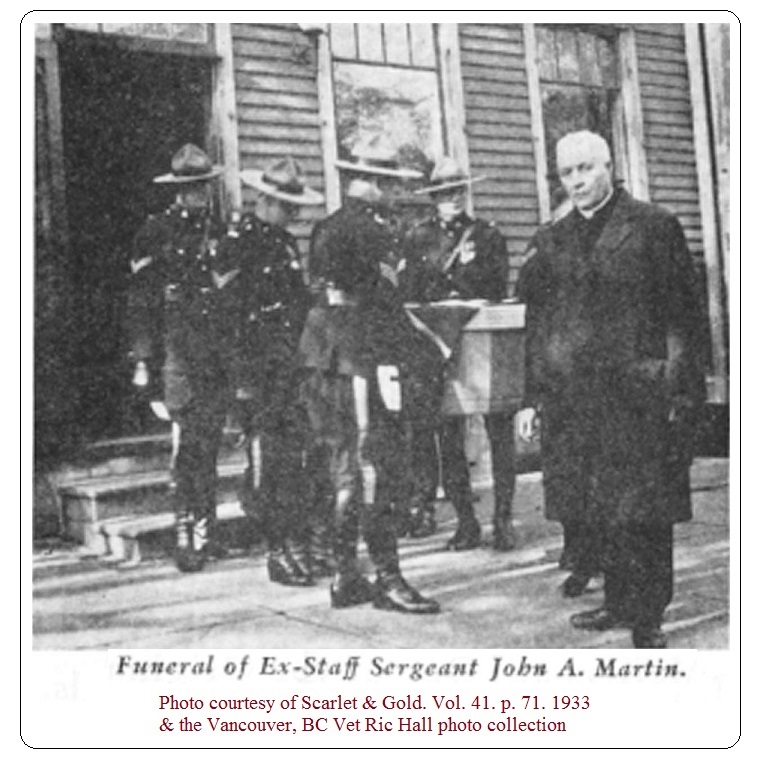
Reporting From the Fort,
J. J. Healy
